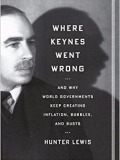
Universally Preferable Behavior
aboutLiberty Portal


Against the State: An Anarcho-Capitalist Manifesto diagnoses what is wrong with the American political system and tells us what we need to fix things. The cure is a radical one because, as the book incontrovertibly shows, the many problems that confront us today are no accident. They stem from the nature of government itself. Only peaceful cooperation based on the free market can rescue us from our present plight.
Against the State is written by Lew Rockwell, the founder of the Mises Institute and LewRockwell.com, and the closest friend and associate of Murray Rothbard, the leading theorist of anarcho-capitalism. Rockwell applies Rothbard’s combination of individualist anarchism and Austrian economics to contemporary America. The book shows how the government is based on war, both against foreign nations and against the American people themselves, through massive invasions of our liberties. Fueled by an out-of-control banking system, the American State has become in essence fascist. We cannot escape our predicament through limited government: the government is incapable of controlling itself. Only a purely private social order can save us, and Rockwell succinctly sets out how an anarcho-capitalist order would work.

* Outsourcing (why it's good for Americans) and zoning restrictions (why they're not)
* Why central planning has never worked and never will
* How prices operate in a free market (and why socialist schemes like rent control always backfire)
* How labor unions actually hurt workers more than they help them
* Why increasing the minimum wage is always a bad idea
* Why the free market is the best guard against racism
* How capitalism will save the environment--and why Communist countries were the most polluted on earth
* Raising taxes: why it is never "responsible"
* Why no genuine advocate for the downtrodden could endorse the dehumanizing Welfare State
* The single biggest myth underlying the public's support for government regulation of business
* Antitrust suits: usually filed by firms that lose in free competition
* How tariffs and other restrictions "protect" privileged workers but make other Americans poorer
* The IMF and World Bank: why they don't help poor countries
* Plus: Are you a capitalist pig? Take the quiz and find out! Breezy, witty, but always clear, precise, and elegantly reasoned, The Politically Incorrect Guide(tm) to Capitalism is a solid and entertaining guide to free market economics. With his twelve-step plan for understanding the free market, Murphy shows why conservatives should resist attempts to socialize America and fight spiritedly for the free market.


